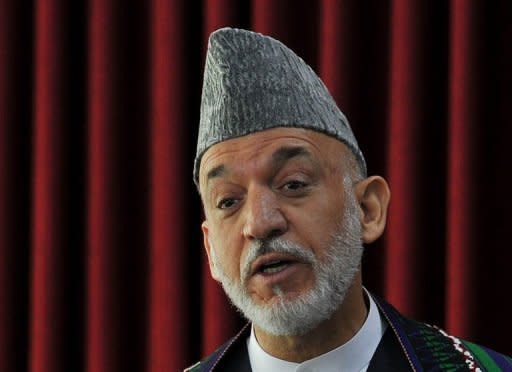Afghans met Taliban leader in Pakistan jail: officials
Afghan government representatives have held secret talks with a key member of the Taliban held in a Pakistani jail officials said Monday -- a move that could signal fresh hope for peace negotiations. The representatives visited Mullah Abdul Ghani Baradar, a powerful Taliban military chief who has been described as the insurgents' second in command, and discussed peace talks with him, an Afghan official said. Baradar, whose 2010 arrest in Pakistan was blamed for sabotaging peace initiatives, is the most important Taliban leader held in prison and was known as a trusted aide to the militants' elusive leader Mullah Mohammad Omar. "Afghan government officials and members of (the) Afghan embassy in Pakistan held secret talks with him (Baradar) in prison two months ago in Pakistan," Mohammad Ismail Qasimyar, a member of Afghanistan's High Peace Council, told AFP. "They talked to him about peace negotiations. The Afghan government has also asked the Pakistani authorities to release him because he has shown interest in peace talks with the government of Afghanistan," Qasimyar said. At the time of Baradar's arrest the Afghan government and the former UN envoy to Afghanistan said his detention had adversely affected efforts to talk to the insurgents in a bid to end the decade-long war. A Pakistani security official confirmed Monday that an official delegation from Afghanistan had made an initial contact with Baradar two months ago. "We still say there are no plans for his release as yet. It remains to be seen how important Baradar is and what role he can play (in peace talks)," the official said. He pointed out that Baradar had been in prison for more than two years, adding: "This is a long time in which faces change and new actors occupy the stage." The new US ambassador to Kabul told a news conference Monday that there are signs that the Taliban are considering peace talks with the Afghan government and "contacts" are taking place. Ambassador James Cunningham did not refer directly to the reported meeting in the Pakistani jail, but said in answer to a question: "There are contacts taking place, mostly at this point among Afghans -- Taliban and Afghans. "There are a number of different elements at play. None of them are yet definitive, creating a concrete way forward, but we do see signs that... there is some rethinking going on among the Taliban about the future choices that they face." Cunningham attributed this to the "clarity of the message" the United States and the West have sent out that they will not abandon Afghanistan when NATO's 130,000 troops pull out in 2014. Afghan President Hamid Karzai has long sought to negotiate with the Taliban but the Islamist militia has in public refused to deal with his administration, branding it an American puppet. Earlier this year the Taliban also announced they had abandoned contact with US officials aimed at securing a prisoner swap as a first step towards peace talks in the Gulf state of Qatar. The US and NATO would welcome Afghan peace talks that would allow them to claim, as they withdraw, that the decade-long war has brought some stability to the country. Without that, there is widespread fear that the Taliban will make gains against the ill-prepared Afghan security forces and that the country will once again plunge into a multi-factional civil war. The Taliban are far from defeated on the battlefield. NATO has noted an 11 percent increase in attacks since the launch of the militants' annual summer offensive over the same period last year.



